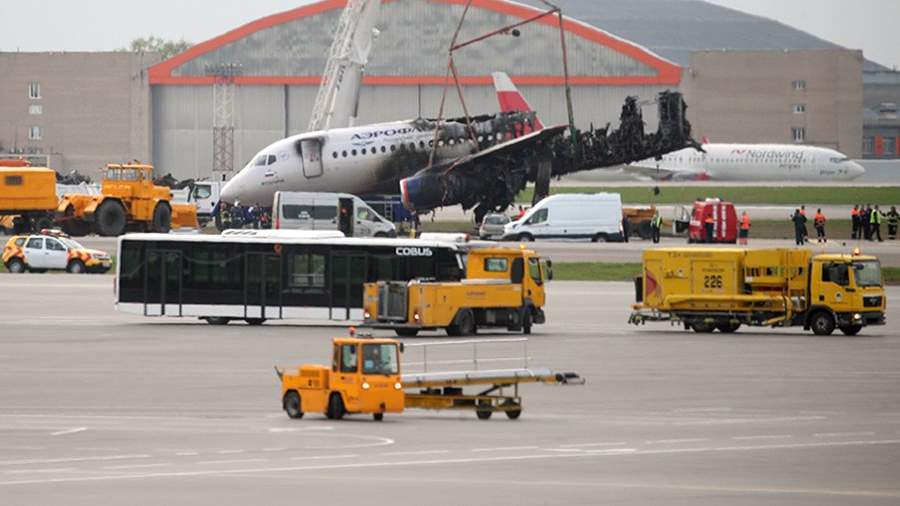A Russian court has finally delivered its judgment nearly four years after the harrowing incident involving the Sukhoi Superjet 100 aircraft at Sheremetyevo International Airport, located in Khimki, Moscow Oblast.
The pilot at the center of the trial, Denis Evdokimov, has been sentenced to six years in a penal colony for breaching safety regulations.
His actions led to the devastating incident where the Superjet 100 aircraft caught fire after a “hard” landing at Sheremetyevo Airport.
The incident tragically caused the loss of 41 lives among those on board, with an additional ten individuals sustaining injuries.
“The court imposed a sentence of six years in prison in a penal colony,” the court said, as reported by Ria Novosti, a state-backed media outlet.

The report said the Khimki City court’s decision aligns with the prosecution’s previous request. On May 24, the prosecutor sought a six-year prison sentence for the pilot under Part 3 of Article 263 of the Criminal Code, which pertains to violating traffic safety rules.
Furthermore, the court has imposed a three-year ban on Evdokimov from operating aircraft. Additionally, he has been ordered to pay one and a half million rubles in compensation to two victims.
The court did not choose the measure of restraint for him, meaning that once the verdict comes into effect, the former commercial pilot must report to the designated penal colony himself.
Following the verdict, Evdokimov did not provide any remarks regarding the court’s ruling. But, he asserted that the aircraft did not meet the required airworthiness standards, doubting its overall safety and operational integrity.
Evdokimov maintains that the catastrophic incident was exacerbated by the lightning strike that directly hit the plane on the fateful day of the crash.
According to his account, this lightning strike resulted in the disabling of the aircraft’s electrical remote control system. Notably, he underscores the absence of any alternative model of mechanical control for the steering surfaces in the specific aircraft involved.
Meanwhile, Evdokimov’s legal representative expressed dissatisfaction with the ruling, affirming the defense’s intention to examine the decision and file an appeal thoroughly.
Russian Sukhoi Superjet 100 Airliner Crash
The Sukhoi Superjet 100 is a jet manufactured by the Russian aerospace company Sukhoi Civil Aircraft Company. It is designed for short to medium-range flights and can carry up to 103 passengers. The aircraft has modern technologies, including advanced avionics and efficient engines.
On May 5, 2019, a tragic accident involving this aircraft unfolded at Sheremetyevo airport, located just outside Moscow, Russia’s capital city and the primary airport serving the region.
The incident involved the Superjet 100, which was operating under the designation Aeroflot Flight 1492. Shortly after takeoff, the aircraft was struck by lightning, resulting in an electrical failure.
In response, Denis Evdokimov and his co-pilot, Maxim Kuznetsov, decided to return to Sheremetyevo for an emergency landing.
The Superjet 100 experienced a hard bounce during the landing attempt, causing the landing gear to collapse. As a result, the aircraft skidded along the runway’s edge, damaging the wings.
The spilled fuel from the wing tanks ignited, leading to a fire that engulfed the rear section of the aircraft. The incident claimed the lives of 41 people on board, while ten others suffered injuries.
Following the charges initially filed in October 2019, investigators accused Evdokimov of failing to adhere to established flight rules and procedures, ultimately leading to his execution of a steep descent that resulted in the crash.
Reports from the incident highlighted notable fluctuations in the aircraft’s pitch before the landing attempt. These findings underscore the investigators’ assertion that Evdokimov’s alleged negligence, characterized by deviating from proper flight protocols, played a significant role in the fatal outcome of the crash.
In response to the accusations, Evdokimov’s legal team countered the charges, asserting that the electrical failure of the Superjet 100 compromised its controllability while raising concerns about the delayed response of the ground emergency personnel.
However, Russian investigators conducted a thorough examination and found no evidence of any malfunction with the aircraft. Furthermore, they dismissed criticisms against first responders and air traffic controllers at Sheremetyevo, emphasizing that they acted appropriately.
The investigative committee also explored the possibility of poor maintenance and adverse weather conditions as contributing factors but ultimately concluded that neither played a role in the tragic incident.
- Contact the author at ashishmichel(at)gmail.com
- Follow EurAsian Times on Google News




